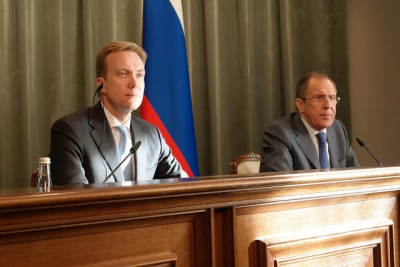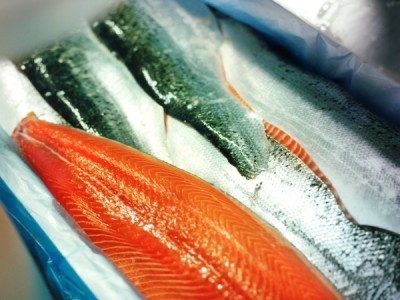The foreign ministers of both Norway and Russia have not only become involved in an ongoing conflict over Norwegian salmon exports to Russia, but also agreed to help settle it. They’ve promised to tackle export barriers allegedly set up by Russian food inspectors who have been accused of both illegal market manipulation and corruption.

As Norwegian officials head for the Winter Olympics starting in Russia this week, many of their government colleagues and leaders of the salmon industry in Norway continue to face an aggravating trade issue. In a lengthy series of articles, newspaper Dagens Næringsliv (DN) has reported on Russian import bans against more than a dozen Norwegian salmon producers who refused to sign exclusive agreements to sell their fish to just one large Russian import firm. DN reports that subsequent charges of illegal salmon market manipulation have been lodged by Russia’s own competition authority (FAS), while corruption charges have also been lodged by American diplomats in diplomatic cables made public through Wikileaks.
The Russian competition authorities’ criticism of Russia’s own food inspectors in its veterinary service is clearly welcome by Norwegian salmon exporters, who’ve long been frustrated by severe restrictions on their attempts to sell top-grade Norwegian salmon to Russian customers keen to buy it. The Russian veterinary authorities claim the salmon doesn’t meet Russian hygiene standards or contains harmful substances, allegations scoffed at by other salmon customers both in Norway and abroad who contend that the Norwegian fish is among the best in the world and sought after by top restaurants and seafood markets. Norwegian inspectors have also been amazed by the Russian claims, contending that they haven’t found any such hygiene of substance problems themselves.

DN reported that an investigation by Russia’s own competition authority tied the exclusion of the Norwegian salmon producers to illegal cooperation between Russian food inspectors at its state veterinary service and the largest Russian importers of salmon. Together, reported DN, FAS claims they created an illegal cartel to gain control over the Russian salmon market.
In US diplomatic cables retrieved by DN, the US ambassador to Russia suggested in 2008 that Russia’s chief veterinarian may have accepted “one bribe too much,” resulting in his sudden “holiday for health reasons” at the time. Another top US diplomat referred to him and his agency as “notoriously corrupt.” but after a three-year absence he was back at work, and shortly afterwards, in 2011, Norwegian salmon producers began having problems if they didn’t sign “exclusive agreements” to sell their fish only to certain Russian importers. They are far from alone in having to face such demands, with DN reporting how US chicken producers, Dutch flower growers, German pork and Turkish fruit and vegetables have also been in the same boat.
Good enough for Alex Sushi, but not Russia
“We began to feel the market tightening up in Russia in 2011,” Odd Strøm, head of salmon producer Nova Sea, told DN. His company has the exclusive Alex Sushi restaurant in Oslo among its customers, but suddenly, Nova Sea salmon wasn’t good enough for the Russian market after Nova Sea declined to sell to only one large Russian importer. Other Norwegian salmon producers feeling the squeeze include state-dominated Cermaq, which also refused to sign exclusivity contracts and advised against it. Some Norwegian producers have gone along with the Russian demands, including Marine Harvest, but either have claimed they felt pressured or were promised market share much higher than they received.
Some salmon producers have admitted they have no proof of a direct connection between the ban on their fish and the absence of their signatures on an exclusive contract, but point to a later lack of documentation of fault and suspect the alleged fault of being fabricated.
Russian inspectors have excluded 13 Norwegian salmon producers from the Russian market because of what they claim are inspection and laboratory results that did not meet standards set by the customs unions between Russia, Kazakhstan and Belarus. Some got another chance last summer, but fresh salmon continued to be banned. Some producers contend the Russians clearly want “more control” over their market, while Norway follows trading systems set by the European Union and the World Trade Organisation.
Top-level meeting
With Norwegian inspectors at the country’s food safety authority Mattilsynet claiming they’ve never found any hygiene or substance problems with the salmon, Foreign Minister Børge Brende has now entered the fray. At a recent meeting with his Russian counterpart Sergei Lavrov, Brende told DN that he “took up the restrictions on fish exports” and that “we agreed that a dialogue between our two nation’s authorities should be intensified.”
Brende claimed that Russia’s veterinary service has “signalled a desire for a dialogue with the Norwegian (food safety authority) Mattilsynet.” Brende said he and Lavrov were “aware” of the report from the Russian competition authority, but that any violation of Russian law must be handled internally in Russia.
“But we expect that this be followed up and given the highest priority,” Brende told DN, adding that he and his staff will now follow up the “dialogue” between Russian and Norwegian authorities, “for the betterment of Norwegian business and jobs.”
Asked whether Norwegian officials had failed to specifically take up the results of the Russian competition authority’s report with their Russian counterparts, Brende merely said it was “critical” to get a “constructive process” going “that we hope will lead to us again being able to fully export fish to Russia. That’s what’s most important both for Norwegian business and jobs, he said.
“We have zero tolerance for corruption, and we have communicated that to Russia,” Brende said, noting that “Russian authorities have acknowledged that corruption is a problem in the country.” Any illegality tied to fish imports in Russia, he said, “is a question that must be answered by Russian courts.”
newsinenglish.no/Nina Berglund

